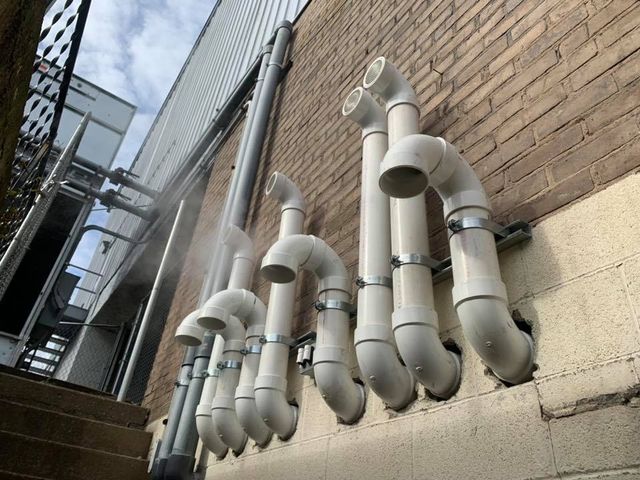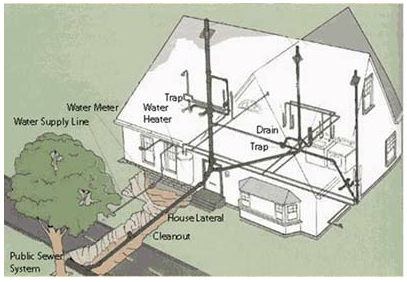What You Need to Know About Your House's Plumbing System Anatomy
What You Need to Know About Your House's Plumbing System Anatomy
Blog Article
The article author is making several great pointers on Exploring Your Homes Plumbing Anatomy overall in the article which follows.

Comprehending just how your home's pipes system works is important for every home owner. From supplying tidy water for alcohol consumption, food preparation, and showering to securely getting rid of wastewater, a properly maintained pipes system is critical for your family members's wellness and convenience. In this thorough overview, we'll discover the intricate network that makes up your home's plumbing and offer tips on maintenance, upgrades, and dealing with common issues.
Introduction
Your home's plumbing system is greater than simply a network of pipes; it's a complicated system that ensures you have access to clean water and efficient wastewater removal. Knowing its components and how they work together can help you prevent costly repairs and ensure every little thing runs efficiently.
Fundamental Parts of a Plumbing System
Pipes and Tubing
At the heart of your pipes system are the pipelines and tubes that bring water throughout your home. These can be made from various materials such as copper, PVC, or PEX, each with its advantages in regards to longevity and cost-effectiveness.
Fixtures: Sinks, Toilets, Showers, and so on.
Components like sinks, bathrooms, showers, and tubs are where water is used in your home. Recognizing just how these components link to the plumbing system aids in detecting troubles and preparing upgrades.
Valves and Shut-off Points
Shutoffs manage the flow of water in your plumbing system. Shut-off valves are essential throughout emergencies or when you require to make repair services, allowing you to separate parts of the system without disrupting water circulation to the entire home.
Water Supply System
Main Water Line
The major water line attaches your home to the metropolitan water or a personal well. It's where water enters your home and is dispersed to different fixtures.
Water Meter and Pressure Regulator
The water meter actions your water use, while a stress regulator guarantees that water flows at a secure stress throughout your home's pipes system, avoiding damage to pipes and components.
Cold Water vs. Warm water Lines
Comprehending the distinction in between cold water lines, which provide water directly from the main, and warm water lines, which lug heated water from the water heater, aids in repairing and planning for upgrades.
Drainage System
Drain Pipes Water Lines and Traps
Drain pipes carry wastewater far from sinks, showers, and bathrooms to the sewer or septic tank. Traps prevent sewage system gases from entering your home and also catch debris that can create blockages.
Ventilation Pipelines
Ventilation pipelines enable air into the water drainage system, stopping suction that could reduce drain and cause catches to empty. Correct air flow is important for keeping the stability of your plumbing system.
Relevance of Appropriate Water Drainage
Making sure correct drain prevents back-ups and water damage. Routinely cleaning up drains and keeping traps can stop costly fixings and extend the life of your pipes system.
Water Heating Unit
Sorts Of Water Heaters
Hot water heater can be tankless or conventional tank-style. Tankless heating units heat water on demand, while containers keep warmed water for instant usage.
How Water Heaters Link to the Plumbing System
Comprehending just how water heaters attach to both the cold water supply and hot water circulation lines aids in identifying concerns like insufficient hot water or leakages.
Maintenance Tips for Water Heaters
On a regular basis purging your water heater to eliminate debris, inspecting the temperature level settings, and checking for leakages can extend its life expectancy and boost energy effectiveness.
Usual Plumbing Issues
Leakages and Their Causes
Leaks can take place due to aging pipelines, loosened fittings, or high water pressure. Attending to leakages promptly stops water damages and mold and mildew growth.
Blockages and Obstructions
Obstructions in drains and bathrooms are commonly brought on by flushing non-flushable products or an accumulation of oil and hair. Making use of drain screens and being mindful of what decreases your drains pipes can protect against clogs.
Signs of Plumbing Issues to Expect
Low tide stress, slow drains, foul odors, or uncommonly high water expenses are indications of prospective plumbing issues that must be resolved promptly.
Plumbing Maintenance Tips
Regular Examinations and Checks
Schedule annual plumbing evaluations to catch problems early. Seek indicators of leakages, corrosion, or mineral buildup in faucets and showerheads.
DIY Maintenance Tasks
Simple jobs like cleansing tap aerators, looking for commode leakages utilizing color tablet computers, or protecting subjected pipelines in chilly climates can avoid major plumbing issues.
When to Call a Professional Plumbing
Know when a plumbing issue requires professional proficiency. Trying intricate repair services without appropriate understanding can result in more damage and greater fixing expenses.
Updating Your Plumbing System
Reasons for Upgrading
Updating to water-efficient components or changing old pipes can improve water top quality, lower water costs, and boost the value of your home.
Modern Plumbing Technologies and Their Advantages
Check out innovations like smart leak detectors, water-saving bathrooms, and energy-efficient water heaters that can conserve money and lower environmental influence.
Expense Factors To Consider and ROI
Determine the upfront prices versus long-term financial savings when thinking about pipes upgrades. Several upgrades pay for themselves via decreased energy bills and less repair work.
Ecological Impact and Preservation
Water-Saving Components and Appliances
Mounting low-flow faucets, showerheads, and bathrooms can significantly minimize water usage without compromising efficiency.
Tips for Decreasing Water Use
Simple routines like fixing leaks immediately, taking much shorter showers, and running full tons of washing and dishes can conserve water and reduced your utility costs.
Eco-Friendly Plumbing Options
Take into consideration sustainable pipes materials like bamboo for floor covering, which is durable and environmentally friendly, or recycled glass for kitchen counters.
Emergency Preparedness
Actions to Take Throughout a Plumbing Emergency situation
Know where your shut-off shutoffs are located and exactly how to shut off the water supply in case of a burst pipeline or significant leakage.
Importance of Having Emergency Get In Touches With Useful
Maintain call information for regional plumbing technicians or emergency situation services easily offered for fast response during a plumbing crisis.
DIY Emergency Fixes (When Suitable).
Momentary solutions like utilizing air duct tape to patch a leaking pipeline or placing a container under a trickling faucet can reduce damages until an expert plumbing professional arrives.
Final thought.
Recognizing the anatomy of your home's plumbing system equips you to preserve it properly, conserving money and time on fixings. By following regular maintenance routines and staying educated concerning modern-day pipes modern technologies, you can guarantee your pipes system runs successfully for several years ahead.
Understanding Your Home Plumbing System: A Comprehensive Guide
Plumbing System: The Lifeline of Your Home
At its core, the plumbing system is designed to perform two primary functions: bring fresh water into your home and remove wastewater. The system is a network of pipes, fixtures, and other components that transport water and sewage. Residential plumbing systems include potable water supply lines, drain-waste-vent (DWV) systems, and various plumbing fixtures that make water use in daily tasks possible.
Key Components:
Water Supply: This part of your plumbing system brings municipal water into your home, passing through the main water supply line. It s responsible for supplying all water needs, from drinking to bathing.
Drainage System: It carries waste and water away from your home to the sewer or septic system. This system includes all the piping within your home that leads to external sewage or septic systems.
Vent System: An essential yet often overlooked component, the vent system allows sewer gases to escape and lets air into the drainpipes, ensuring water and waste move correctly through the system.
Fixture: More Than Just Taps and Toilets
Plumbing fixtures are the most interactive parts of the plumbing system, including faucets, showers, toilets, and sinks. Each fixture is connected to the plumbing system and plays a role in either the delivery of freshwater or the disposal of waste and wastewater.
Types of Fixtures:
Faucets and Sinks: Used for washing hands, dishes, and other daily water needs.
Toilets: Dispose of human waste through the sewage system.
Bathtubs and Showers: Provide bathing facilities, requiring both hot and cold water supply.
Water Supply: The Source of Life
The water supply system is a critical component, ensuring that potable water is available throughout your home for various uses, including drinking, cooking, and cleaning. This system consists of pipes that distribute water to different parts of the house, controlled by valves to regulate the water flow.
Types of Plumbing: Materials and Methods
Various types of plumbing systems and materials are used in residential settings, each with its advantages and applications. From copper and PVC pipes for water supply to cast iron and ABS for drainage, the choice of materials can impact the longevity and efficiency of your plumbing system.
https://intownplumbingtx.com/articles/home-plumbing-system-guide/

Understanding Your Home Plumbing System: A Comprehensive Guide
Plumbing System: The Lifeline of Your Home
At its core, the plumbing system is designed to perform two primary functions: bring fresh water into your home and remove wastewater. The system is a network of pipes, fixtures, and other components that transport water and sewage. Residential plumbing systems include potable water supply lines, drain-waste-vent (DWV) systems, and various plumbing fixtures that make water use in daily tasks possible.
Key Components:
Water Supply: This part of your plumbing system brings municipal water into your home, passing through the main water supply line. It s responsible for supplying all water needs, from drinking to bathing.
Drainage System: It carries waste and water away from your home to the sewer or septic system. This system includes all the piping within your home that leads to external sewage or septic systems.
Vent System: An essential yet often overlooked component, the vent system allows sewer gases to escape and lets air into the drainpipes, ensuring water and waste move correctly through the system.
Fixture: More Than Just Taps and Toilets
Plumbing fixtures are the most interactive parts of the plumbing system, including faucets, showers, toilets, and sinks. Each fixture is connected to the plumbing system and plays a role in either the delivery of freshwater or the disposal of waste and wastewater.
Types of Fixtures:
Water Supply: The Source of Life
The water supply system is a critical component, ensuring that potable water is available throughout your home for various uses, including drinking, cooking, and cleaning. This system consists of pipes that distribute water to different parts of the house, controlled by valves to regulate the water flow.
Types of Plumbing: Materials and Methods
Various types of plumbing systems and materials are used in residential settings, each with its advantages and applications. From copper and PVC pipes for water supply to cast iron and ABS for drainage, the choice of materials can impact the longevity and efficiency of your plumbing system.
https://intownplumbingtx.com/articles/home-plumbing-system-guide/
I'm certainly very occupied with and I am assuming you appreciated our blog posting. Are you aware of another individual who is inquisitive about The Inner Workings of Your Home's Plumbing? Please feel free to share it. I recognize the value of reading our article about The Inner Workings of Your Home's Plumbing.
Request Appointment Report this page